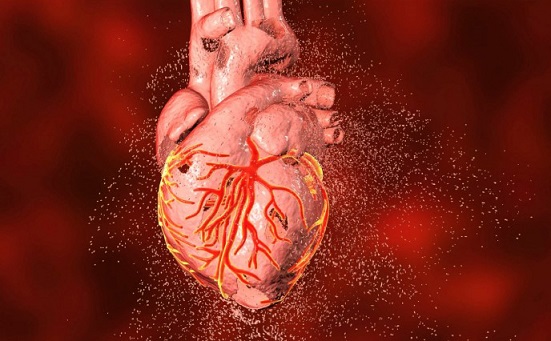Norwegian Scientists Discover That Metabolite from Gut Microbiota Found to Worsen Heart Damage in COVID-19 Patients
Nikhil Prasad Fact checked by:Thailand Medical News Team Apr 24, 2025 2 hours, 6 minutes ago
Medical News: A strange gut-derived chemical called imidazole propionate has been discovered at unusually high levels in the blood of COVID-19 patients who suffer heart problems—raising alarms about a new link between gut bacteria and severe complications of the SARS-CoV-2virus.
 Norwegian Scientists Discover That Metabolite from Gut Microbiota Found to Worsen Heart Damage
Norwegian Scientists Discover That Metabolite from Gut Microbiota Found to Worsen Heart Damage
in COVID-19 Patients
The study, conducted by researchers from Oslo University Hospital, Akershus University Hospital, the University of Oslo, University of Tromsø, and BEVITAL in Norway, has added a surprising new twist to our understanding of how COVID-19 affects the body. While the virus is known primarily for attacking the lungs, this
Medical News report shows that a microbial byproduct made in the gut might play a significant role in damaging the heart—both during infection and months after recovery.
The Role of a Microbial Molecule Called Imidazole Propionate
Imidazole propionate (ImP) is a chemical produced when gut bacteria break down a common dietary protein building block called histidine. This compound has previously been linked to chronic diseases such as diabetes and heart failure. In this new study, researchers wanted to explore whether it also plays a role in COVID-19—especially in patients who end up with heart complications.
To find out, the team examined blood samples from more than 300 hospitalized COVID-19 patients across two major clinical cohorts in Norway. Some of these patients had evidence of cardiac involvement, as detected by specific biomarkers that indicate damage or stress in heart tissue. These included high levels of NT-proBNP (a sign of heart strain) and troponin T (a marker of heart muscle injury).
Their analysis found that COVID-19 patients with heart complications had significantly higher levels of imidazole propionate in their blood compared to those without heart problems. These elevated levels were seen not only in the acute stage of infection but persisted for at least three months after the patient had been discharged from the hospital.
Strong Link Between Gut Chemical and Heart Injury
The scientists dug deeper and confirmed their findings using both standard and advanced methods of blood analysis. They found that imidazole propionate levels strongly correlated with levels of troponin T, which is considered a gold-standard marker for heart damage. Interestingly, the chemical did not correlate with another heart stress marker (NT-proBNP), suggesting that its link to heart injury may involve different mechanisms.
Statistical models showed that patients with high levels of imidazole propionate were over four times more likely to have heart complications during COVID-19, even after adjusting for age, gender, severity of lung failure, and other clinical factors.
Why This Matters and What It Might Me
an
The discovery of imidazole propionate’s role in COVID-19 heart damage opens up an entirely new frontier in understanding post-viral complications. Researchers believe that when COVID-19 severely affects the gut—leading to what’s known as “leaky gut syndrome”—bacteria and their byproducts can enter the bloodstream.
This may trigger inflammation or directly interfere with heart function.
Imidazole propionate, in particular, has been shown to block pathways in the body that are important for protecting the heart and forming new blood vessels. The study’s authors suggest this could be one reason why heart damage in COVID-19 may persist even long after patients leave the hospital.
Conclusions and the Road Ahead
The findings of this research highlight the need for more attention to gut health and the gut-heart connection in patients recovering from COVID-19. This study is the first to directly link imidazole propionate to cardiac injury in COVID-19, and it raises the possibility of using the molecule as a biomarker to identify patients at higher risk of long-term heart problems. The researchers call for future investigations into whether targeting the gut microbiome or the effects of this molecule could help reduce complications in COVID-19 and other viral illnesses. For now, monitoring imidazole propionate levels could become a vital part of managing post-COVID-19 care.
The study findings were published in the peer reviewed Journal of Infection.
https://www.sciencedirect.com/science/article/pii/S016344532500088X
For the latest COVID-19 News, keep on logging to Thailand
Medical News.
Read Also:
https://www.thailandmedical.news/news/many-who-had-mild-covid-19-have-hidden-heart-issues-including-perfusion-defects-and-echocardiographic-strain-abnormalities
https://www.thailandmedical.news/news/covid-19-induces-ferroptosis-transcriptomic-alterations-within-the-heart-causing-cardiac-damage
https://www.thailandmedical.news/news/deadly-drug-combo-involving-covid-19-antiviral-and-blood-pressure-med-found-to-trigger-complete-heart-block
https://www.thailandmedical.news/articles/coronavirus
https://www.thailandmedical.news/pages/thailand_doctors_listings
https://www.thailandmedical.news/articles/hospital-news
